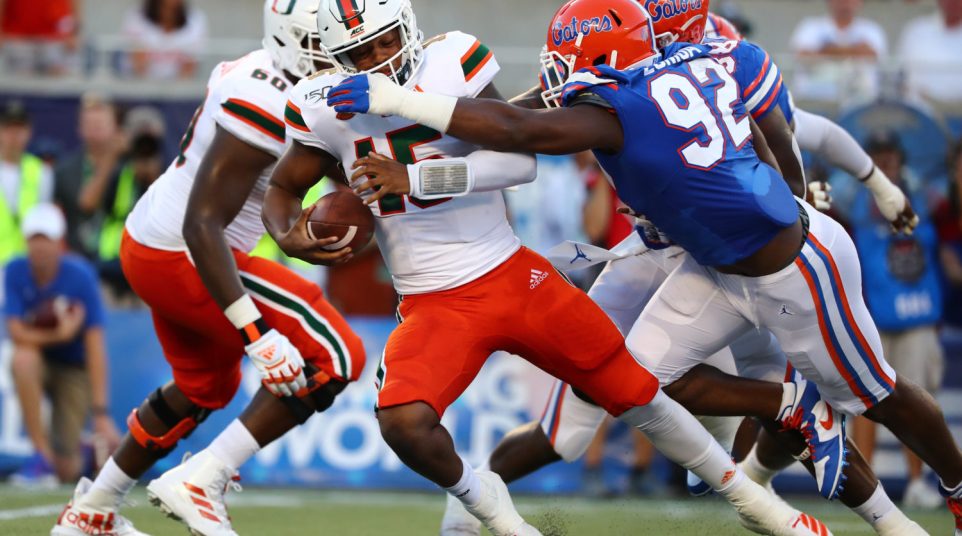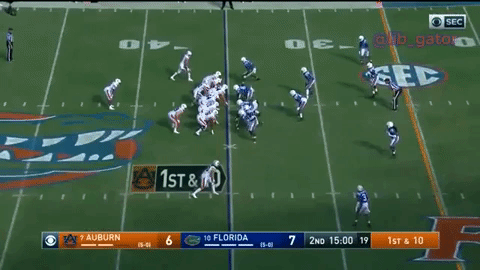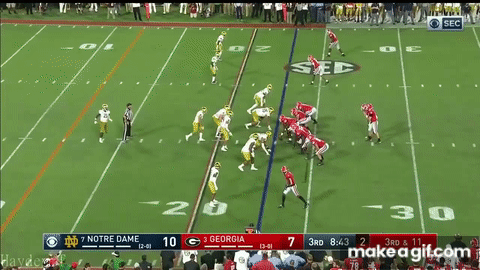
Florida football: 5 reasons the Gators will beat Georgia in the Cocktail Party
For the second consecutive season, but only the second time this decade, the Cocktail Party will feature a battle of top-10 teams Saturday when No. 8 Georgia faces off against No. 6 Florida.
Florida-Georgia (or Georgia-Florida, for some) is one of college football’s best rivalries, a game woven into the very fabric of the lives of fans on both sides.
Always anticipated and often close and exciting, this year’s edition might be the biggest SEC East game played in several years.
On one side, there’s Kirby Smart’s budding behemoth of a Georgia program in Year 4. As Matt Hayes wrote in this space this week, Georgia has a deeper roster than Florida and has recruited better. The Bulldogs have won an SEC championship under Smart and come within a soul-crushing Tua Tagovailoa throw from winning a national championship. Georgia enters Jacksonville with an elite offensive line, All-American-caliber players at quarterback and running back, the SEC’s best rushing offense and a defense that ranks first in the SEC in scoring, eighth nationally in yards allowed per play, ninth in pass efficiency defense, fourth in S & P defense and seventh in total defense. Those are all big-time reasons to think Georgia will win this game, perhaps handily.
On the other side, there’s Florida in Year 2 under Dan Mullen. The Gators surprised everyone last season when they won 10 games and a New Year’s Six Bowl a year removed from finishing 4-7 in Jim McElwain’s failed final campaign. The Gators were expected to maintain that standard this season, but they weren’t really expected to challenge Georgia for SEC East supremacy. That was still a year or two away, as Mullen reloaded the program with depth and developed it. Instead, Florida is 7-1, with its only loss a competitive one at No. 1 LSU. If Florida wins Saturday, it will have an inside track to Atlanta and a chance to accomplish even more.
In other words, there’s plenty at stake for each program, and that’s before you even talk about the prevailing narratives around the programs. A Gators win would also do a great deal to change the recruiting narrative that Smart and Georgia are ahead of Florida on the national stage. A Georgia loss, and suddenly Smart has gone from the guy who nearly won a national championship in his second season to the coach who choked away the SEC Championship on a fake punt, was beaten soundly in the Sugar Bowl and lost to two teams in his own division by Year 4. There has never been any doubt about the trajectory of the Smart era, but there would be if Florida wins Saturday.
Here are five reasons the Gators can win and create that doubt in Athens.
The return of Zuniga and Greenard will help Florida slow Georgia’s run game
Here is something I can say with a high degree of certainty about Saturday’s game: Georgia is going to have some success running the football. It is a question of scale.
It’s no secret that the Gators have been gashed on the ground in their previous two games. South Carolina and LSU combined to average almost 7 yards a carry, and both ran for more than 200 yards against a depleted Gators front that at points in each game was missing as many as three starters. The key pieces of Florida’s defensive line, of course, are bookend defensive ends Jabari Zuniga and Jon Greenard, who are All-America candidates.
Zuniga has battled an ankle injury since early in the Kentucky game on Sept 14, missing much of the season. He played two quarters before reinjuring his ankle against LSU on Oct. 12. Greenard was injured against Auburn on Oct. 5 and lasted only one play against LSU, missing the South Carolina game a week later. That means the Gators have played the bulk of their SEC schedule with only one of them — Greenard — and the past six quarters with neither of them. It’s no coincidence that Florida’s problems against the run have come in those six quarters.
With Zuniga out and Greenard in, Florida was a top-15 rushing defense entering the LSU game. The Gators frustrated Auburn’s power run game thanks in large part to Greenard’s ability to consistently set the edge, allowing other linemen or linebackers to fit gaps and make plays.

Without Greenard and Zuniga, Florida has been less able to contain the edge, resulting in linebacker overpursuit or blockers being able to engage linebackers on the second level, as in this play, which came on Florida’s first play against LSU without both:
Wow ! Le juke move de RB Clyde Edwards-Helaire pour les Tigers ! Une course de 57 yards qui met LSU en excellente position. pic.twitter.com/wfZwhhn7NJ
— TBP College Football (@thebluepennant) October 13, 2019
All told, Florida has played exactly one SEC series with both Greenard and Zuniga on the field. If both play against Georgia, as expected, that’s a massive upgrade for the Gators and one that couldn’t come at a better time.
Georgia is an elite rushing team, ranking fifth nationally in yards per attempt (6.1) and 11th in rushing offense.
The star, of course, is D’Andre Swift, who I think is the nation’s best running back. Swift ranks second in the SEC in rushing yards (752) and first in yards per attempt among players with 75 or more carries (6.8). You don’t stop him, really — he had more than 100 yards in Georgia’s loss to South Carolina and hasn’t been held to less than 4.9 yards a carry since last season’s Sugar Bowl loss to Texas. The question is whether you can slow and contain him enough to force Georgia to beat you with balance. With Greenard and Zuniga, the Gators have the ability to do just that.
Jake Fromm is great, but his receivers won’t be open much against Florida
Fromm is, as I wrote last week, about all you’d want in a starting quarterback. He’s a winner (SEC Championship, Rose Bowl). He’s a leader. He makes those dime-dropping back-shoulder throws that are almost indefensible. He has also played some of his best football against Florida, lighting the Gators up for 250 yards and three TDs a season ago. Fromm will be ready to play Saturday.
That said, Georgia’s receivers have struggled this season against Power 5 opponents.
Georgia has only five receivers or tight ends with more than 10 receptions this season, and of those, only true freshman George Pickens, Miami graduate transfer Lawrence Cager and junior Demetris Robertson have 10 or more against Power 5 defenses. The Dawgs have struggled against both zone and man, as well. Here, Notre Dame plays cover zero, and despite a great throw from Fromm, Robertson can’t get any separation.

South Carolina also played a lot of man coverage, limiting Fromm to a 54.9 completion percentage. Kentucky played predominantly zone (71 percent of snaps), albeit in a rain storm, and Fromm was limited to just 2.9 yards per attempt, with receivers simply failing to exploit gaps downfield.
Florida will be just the second top-25 pass defense Georgia has faced. The previous — Kentucky — really suffocated Georgia’s receivers. As Sydney Hunte wrote this week at SDS, the Bulldogs need to take shots downfield to keep Florida honest against the run.
Cager’s return should help — even if he isn’t 100 percent, he is physical and a load — but a secondary guy, whether the mega-talented Pickens or another one of Georgia’s receivers, needs to step up. They’ll also face as good a corner tandem as there is in America in CJ Henderson (projected as the No. 10 pick in the NFL draft in Todd McShay’s latest mock) and Marco Wilson, who will also play on Sundays. This is an edge for Florida, and one that could be decisive.
Florida’s offensive line will play its best football game
Quietly, Florida’s much-maligned offensive line has been trending up.
After struggling against an Auburn front that bullies basically everyone, the Gators’ front was solid, if not spectacular, at LSU in Death Valley and then put together its most complete game of the season at South Carolina two weeks ago.
The Gamecocks bullied Georgia up front, registering three sacks and creating havoc on 11 Fromm passing attempts, per Stats Solutions. So Florida’s ability to slow them down and limit them to only two sacks and five havoc plays is all the more impressive.
Florida had its best game of the season running the ball against South Carolina (5.1 per carry), a sign that the unit, which has pass-blocked relatively well, is making strides in the run game as well.
Georgia is tremendous up front against the run, so I don’t expect Florida to pound the rock. That’s not the Gators’ identity. But I do think Florida can run the ball enough to have the threat of balance, and that might be enough against a Georgia defense that ranks 98th in sack rate and 95th in defensive havoc rate this season, despite playing a schedule that to date has featured only one Power 5 offense ranked in the top 50 nationally (Notre Dame).
Florida matches up better here than people think, and with their best playmaker back in receiver Kadarius Toney, the Gators’ run game will be versatile enough to find success on occasion, which may be enough.
Florida’s receivers and tight ends will win one-on-one battles
On paper, Georgia has been very good against the pass this season, ranking ninth nationally in pass efficiency defense and allowing only 5 yards per attempt in the air, good for third in the country.
But here are the pass efficiency rankings of the teams Georgia has played in the Power 5: Notre Dame (25), Tennessee (67), South Carolina (111), Kentucky (124), Vanderbilt (125). Woof.
The one capable pass offense to play Georgia, Notre Dame, threw for 275 yards, devastating the Bulldogs with big tight end Cole Kmet in particular, who gouged the Bulldogs for 108 yards. Credit Georgia, which consistently made stops in its own territory and won the game. But Notre Dame was competent throwing the football and found success.
The other offenses, save Vanderbilt, featured backup quarterbacks or, in some cases, third-string quarterbacks who play wide receiver. At a minimum, Georgia’s secondary hasn’t been tested much since defeating Notre Dame.
It will be Saturday in Jacksonville, and Florida has the goods to win enough of those one-on-one matchups to make the difference.
The Gators rank 19th nationally in pass efficiency offense, and the Gators have six players with at least 15 receptions. Tyrie Cleveland has 14 and Jacob Copeland 12, as well, which gives the Gators eight guys who can beat you in the passing game even before you factor in Kadarius Toney, who will return from an arm injury. The most dangerous of these is Kyle Pitts, who is like Kmet except fast.
Here’s Pitts manhandling Grant Delpit, the best defensive back in America.
Kyle Pitts is a beast. That's Grant Delpit he's up against here. Also a great throw from Kyle Trask. pic.twitter.com/jNnf84SvJj
— Sam Cooper (@SamDCooper) October 14, 2019
Those are the types of one-on-ones you need to win to beat Georgia, and the Gators have the horses to do just that.
Whom do you trust to win one game: Mullen or Smart?
First things first.
Smart was 7-0 against Mullen as the defensive coordinator at Alabama, helping Nick Saban’s teams limit Mullen’s teams to just 8.6 points per game. Those Alabama wins included four games when Mullen’s Mississippi State teams were ranked, and one in which Mullen had Mississippi State ranked No. 1 in the country. Smart is also 2-0 against Mullen as a head coach, whipping Mississippi State, 31-3, in his second season and besting Mullen again, 36-17, last year in the Cocktail Party. That’s a ton of success for Smart against Mullen.
Maybe Smart just understands Mullen’s scheme and out-thinks him every time.
Then again, speaking of coordinator victories, when Mullen was offensive coordinator at Florida, he helped Urban Meyer’s Florida teams score 31 points, tally 400 yards and win an SEC Championship against a Smart defense. Is that loss on Smart or Saban? Who gets credit?
Is it possible that personnel matters? I think it does. I think the fact that Florida and Georgia are on closer footing talent-wise than any of Mullen’s Mississippi State teams were with Alabama is a big deal.
I also know this.
Among active coaches since 2014, the first season of the playoff era, only Saban (15), Dabo Swinney (13) and Ed Orgeron (eight) have more victories against top-10 opponents than Mullen (seven). Smart? He’s 4-3 in those games. That isn’t bad — it’s just not as good as Mullen, who has been playing with less talent.
The other thing with Smart is that recent history makes you wonder. We all know about the fake punt last season in the SEC Championship. But what about the decision to run one more play late against South Carolina, rather than put the game on the leg of his All-America kicker? What about the fake field goal against LSU in 2018? What about an offense that has looked downright unimaginative over the course of this season?
Silly opposing fans might tell you Smart is only a great recruiter. That’s nonsense. He’s one of the best defensive minds in the sport, college or pro.
But who are you trusting to understand the rhythm and flow of one game and to find a way to make the in-game adjustments and calls you need to win: Kirby Smart or Dan Mullen?
If your answer isn’t Mullen, you might be a silly opposing fan, too.
